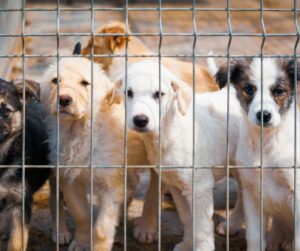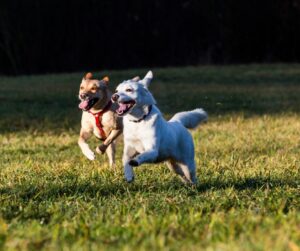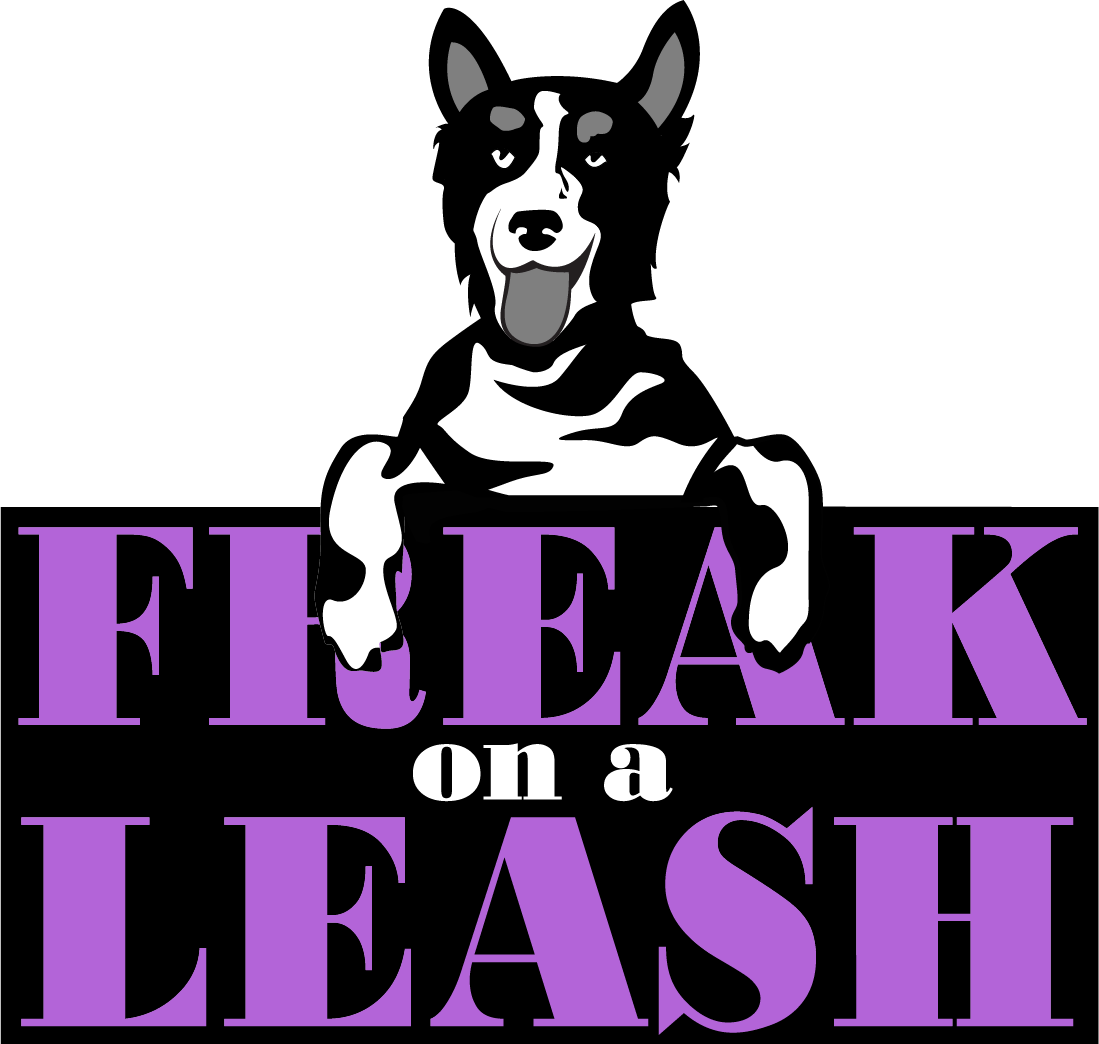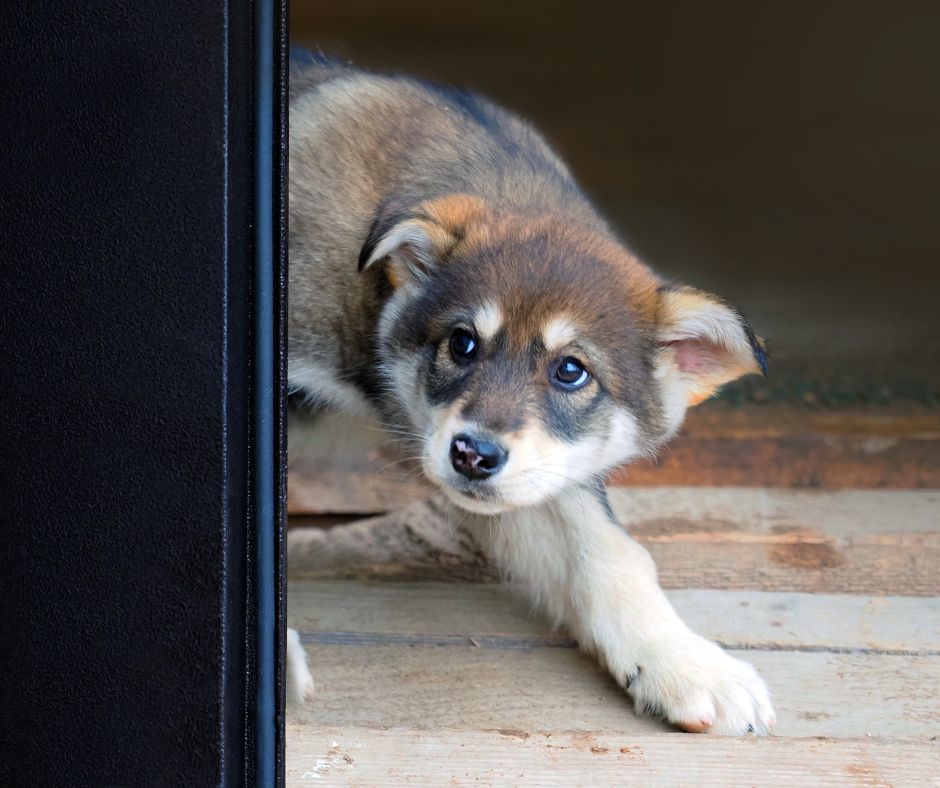Welcoming a new puppy into your home can be an exciting and joyous experience. However, as a new pet parent, you may notice some behavior issues in your new friend. One of the most common problems in puppies is fearfulness. It’s essential to understand that fear is a natural emotion for puppies and dogs, just like it is for humans. As responsible pet owners, it’s our duty to recognize and address these behaviors before they escalate into more significant problems. In this blog post, we will cover everything you need to know about fearful puppies–from recognizing signs of fear in your dog to the causes behind their fearful behavior. We will also discuss how fear can lead to behavioral issues in puppies and when you should seek professional help. Finally, we will provide different training methods that can help your fearful puppy overcome its fears and lead a happy life with you.
Understanding Fear in Puppies
Fearful behavior in puppies can result from various factors. Early socialization plays a crucial role in helping puppies overcome their fears. It is important to recognize the signs of fear in puppies to address the issue effectively. These signs may include trembling, hiding, or excessive barking. By understanding the root causes of fear in puppies, we can guide appropriate intervention and provide the necessary support.
Puppies are often fearful due to limited exposure to different stimuli and experiences. This is why early socialization is essential. Finding a well run puppy class with positive reinforcement trainers can be a great step to avoid fearfulness. This method of training helps build confidence and resilience to new situations. If left unaddressed, fear in puppies can lead to long-term behavioral problems. However, the good news is that with the right training and guidance, many puppies can overcome their fears.
In the long run, addressing fear in puppies leads to better overall behavior. It helps them become well-adjusted adult dogs who can cope with different situations and interact positively with other dogs and people. If you have a fearful puppy, remember that there are effective ways to address these concerns, starting with early socialization and understanding not putting your puppy in situations they are not ready to handle.
 Recognizing Signs of Fear
Recognizing Signs of Fear
By watching for body language cues like cowering or tail tucking, you can identify when your puppy is experiencing fear. Excessive panting or drooling may also indicate fear in puppies. Another common sign of fear is avoidance behavior, where your puppy tries to stay away from certain situations or people. Seeking out comfort from their owner is another way puppies display fear. Dilated pupils and flattened ears are additional physical signs to watch for, as they may indicate fear in your puppy. It is important to pay attention to any sudden changes in behavior or temperament, as these could be indications of your puppy getting uncomfortable. .
Common Causes of a Puppy’s Fearful Behavior
Past traumatic experiences and a lack of early socialization can lead to fear in puppies. Some puppies may have a genetic predisposition towards anxiety, making them more prone to fear. Negative interactions with humans or other animals can also cause fearful behavior in puppies. Even changes in the environment or a puppy’s routine can trigger fear responses. It is important to understand these common causes behind a puppy’s fearful behavior in order to address and help them overcome their fears.
Recognizing the root cause of a puppy’s fear is the first step in addressing their behavior problems. By identifying whether it stems from past traumatic experiences, lack of socialization, genetics, negative interactions, or changes in their environment, owners can take appropriate measures to alleviate their puppy’s fears. Understanding the underlying causes of a puppy’s fearful behavior allows for targeted interventions and personalized approaches to help them feel safe and secure.
By implementing positive reinforcement techniques and seeking professional help when needed, owners can create a supportive environment for their fearful puppy to thrive. Remember, patience, understanding, and a compassionate approach are key in helping puppies overcome their fear and succeed in building confidence.
 Is Your Puppy’s Fear a Result of Past Trauma?
Is Your Puppy’s Fear a Result of Past Trauma?
Fearfulness often results when a puppy has not been appropriately exposed to certain things. Things a puppy didn’t experience when young (up to 16 weeks of age) will often be frightening. Some puppies may exhibit fear due to past trauma, such as abuse or neglect. Traumatic events like accidents or injuries can also impact a puppy’s behavior.
How Fear Leads to Behavioral Problems in Puppies
Fear in puppies can have a profound impact on behavior. If not addressed early on, fear can escalate into aggression, resulting in potential harm to others. Additionally, a puppy’s fear can lead to destructive behaviors, such as chewing furniture or personal items. Separation anxiety is another common issue that may develop in puppies with unresolved fear. These anxious pups may exhibit excessive barking or whining when left alone.
The Connection Between Fear and Aggression in Dogs
Fear in puppies can trigger defensive aggression, leading to reactive behaviors when they perceive a threat. Aggression is a tactic to protect themselves from what they fear. Remember that puppies can be more susceptible to fear and aggression, especially when they haven’t been properly socialized or have had negative experiences. It is important to create a safe and positive environment for them to thrive.
Addressing fear-related behavior problems early in a puppy’s life is critical to preventing them from worsening and negatively impacting their overall well-being. Through timely intervention, puppies can develop coping mechanisms to deal with fear, which helps set them up for better long-term behavior. Ignoring fearful behaviors can lead to the development of more serious and long-lasting behavioral issues in dogs. Early intervention and positive reinforcement training are crucial in minimizing fear-based aggression. Consulting with a professional trainer or behavior consultant is highly recommended when dealing with aggression in puppies.
 Can a Puppy Outgrow Its Fears?
Can a Puppy Outgrow Its Fears?
It is possible for puppies to outgrow their fears with proper training and socialization. As they mature and gain confidence, many puppies naturally overcome some of their fears. However, without intervention, some fears may persist into adulthood. Early intervention and consistent rewards-based training are most successful in helping a puppy overcome fear. Progress may vary for each individual puppy.
Impact of Ignoring Your Puppy’s Fearful Behaviors
Ignoring your puppy’s fearful behaviors can have a significant impact on their overall well-being. As previously discussed, unaddressed fear can escalate into more severe behavioral issues, such as aggression or withdrawal. This can lead to a decline in your puppy’s quality of life and the potential for long-lasting psychological effects.
To prevent these negative outcomes, it is important to provide consistent support and positive reinforcement to your fearful puppy. By offering comfort, reassurance, and rewards when your puppy displays bravery or exhibits good behavior, you can help build their confidence and alleviate their fears. Remember, addressing fear early on is key to preventing the development of long-term behavior problems.
Different Training Methods to Help Your Fearful Puppy
To address behavior problems in dogs, especially in fearful puppies, various training methods can be employed. An effective approach is positive reinforcement training, which focuses on rewarding good behavior and building a puppy’s confidence. By using treats, praise, and play as rewards, you can create a positive association with desired behaviors and help your puppy feel more secure.
Gradual exposure to fear triggers is another valuable technique. By gradually introducing your puppy to situations or stimuli that make them anxious, you can help desensitize them over time. This process must be done carefully and at a pace that the puppy is comfortable with to prevent worsening the fear response.
Counterconditioning is a powerful tool to help puppies associate positive experiences with formerly fearful stimuli. By pairing fearful triggers with enjoyable activities or rewards, you can change your puppy’s emotional response and reduce their anxiety.
Working with a professional trainer experienced in fear-based behaviors can provide invaluable guidance. These trainers have the expertise to tailor training methods specifically to your puppy’s needs and can support you throughout the process.
When Should You Seek Professional Help?
If your puppy’s fear is causing significant distress or interfering with daily life, it may be time to consult a professional. Seeking guidance from a veterinarian or trainer specializing in behavior problems will provide a customized plan for your fearful puppy and prevent behaviors from worsening. A veterinary behaviorist can also help to address any underlying health problems that might be contributing to the fear.
 Role of Veterinary Behaviorists in Treating Fearful Puppies
Role of Veterinary Behaviorists in Treating Fearful Puppies
Veterinary behaviorists play a crucial role in diagnosing and treating behavior problems in dogs, including fearful puppies. With their in-depth knowledge of canine behavior and psychology, they can develop a comprehensive treatment plan tailored to address your puppy’s specific needs. Along with behavioral modification techniques, they may also recommend medication or other interventions to help manage fear and anxiety in your puppy.
Veterinary behaviorists work closely with your regular veterinarian to provide holistic care for your puppy. This collaboration ensures that your puppy receives the necessary medical treatment alongside behavior therapy. When it comes to treating fearful puppies, veterinary behaviorists take into account factors such as breed tendencies, previous experiences, and individual characteristics. They understand that each puppy is unique and requires personalized attention and care. By addressing both the physical and psychological aspects of your puppy’s well-being, veterinary behaviorists offer a more comprehensive approach to managing and resolving behavior problems.They are there to guide you through the process, offering support, compassion, and expertise every step of the way.
What Are the Long-Term Implications of a Fearful Puppy if Left Untreated?
Neglecting to address fear in puppies can have lasting consequences. Untreated, unresolved fear can lead to behavior issues in adulthood, hindering socialization and causing aggression or destructive behaviors. A puppy’s overall well-being and quality of life are significantly impacted when fear goes unaddressed. Early intervention is most important for preventing future behavior problems and ensuring a confident, happy adult dog.
Conclusion
It is important to understand that fearful behavior in puppies is not something that should be ignored or brushed off as a phase. Early intervention is crucial for addressing fear-related behavior problems and preventing long-term implications. By recognizing the signs of fear in your puppy and understanding the common causes behind their fearful behavior, you can take the necessary steps to help them overcome their fears. Positive reinforcement training methods, such as rewards-based training, can be effective in addressing fear in puppies. However, if your puppy’s fear persists or worsens, it may be necessary to seek professional help from a veterinary behaviorist. Remember, addressing your puppy’s fearful behavior with compassion and patience will lead to a happier and more confident companion.

